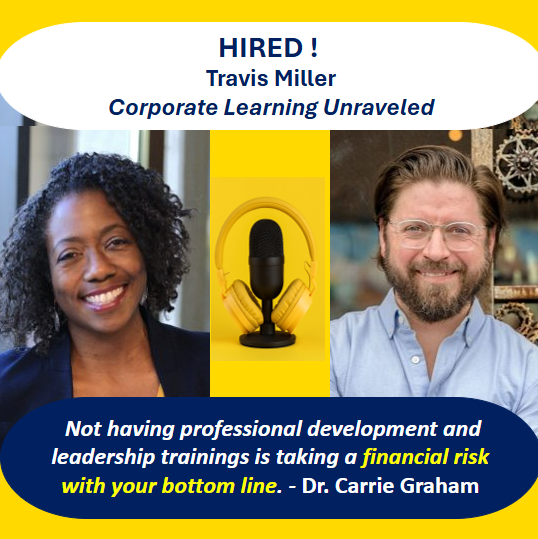Episode Summary
Travis Miller host of Hired! interviews Dr. Graham who reveals that successful professional development plans must focus on understanding adult learners as individuals with rich life experiences and unique value systems, rather than simply delivering content. Her approach to leadership skills training emphasizes that organizations must empower employees by creating inclusive, reflective learning experiences that connect to personal values and provide comprehensive support for skill application.
Listen Here > https://youtu.be/aBfAd5XBQFs?si=NHy8MoLz9vyjNwov
10 Key Points
- Adult Learning Theory Foundation: Adult learners bring rich life experiences, opinions, and mental models that must be acknowledged and incorporated into training design.
- The "Who, Not What" Principle: Organizations typically focus on content and delivery methods but rarely consider who the individual learners are beyond demographics or job roles.
- Training Begins Before Hiring: Effective training and development starts during the hiring process by understanding candidates' values and motivations through intentional interview questions.
- Real-Time Feedback Integration: Successful training incorporates immediate feedback and creates space for reflection, allowing facilitators to gauge participant engagement and adjust accordingly.
- Avoid the Bell Curve Trap: Rather than focusing solely on early adopters or dismissing resistors, organizations should engage all learners, particularly leveraging the wisdom of long-tenured employees who may initially resist.
- Reactive Training Creates Resentment: Training that only responds to problems without addressing root causes or providing space for discussion breeds disengagement and cynicism.
- Values-Based Learning Connection: Training effectiveness dramatically improves when content connects to participants' personal and professional value systems.
- Leadership Skills Gap: Many individuals are promoted to management positions without receiving proper leadership skills training, creating organizational risks and employee turnover.
- Holistic Professional Development: Organizations that support employees as whole people (including stress management, wellness, and personal development) see better training outcomes.
- Training Culture Assessment: Organizations should regularly evaluate their training processes, culture, and belief systems rather than waiting for future challenges to emerge.
10 Key Takeaways/Action Items
- Implement Values Discovery: During hiring, ask specific questions about candidates' motivations and values, then use this data to inform training design for new cohorts.
- Create Pre-Training Assessments: Before implementing new systems or processes, conduct focus groups or surveys to understand employees' current knowledge and concerns.
- Build Reflection Time into Training: Always include structured time for participants to share thoughts, concerns, and feedback during training sessions.
- Engage Resistors Early: Identify potential resistors (often long-tenured employees) and involve them in vetting new systems, leveraging their institutional knowledge.
- Develop Sequential Training Systems: Create organized, systematic approaches to training that span an employee's entire tenure, not just onboarding.
- Address Root Causes: When problems arise, use training as an opportunity to discuss foundational issues and prevent future occurrences, not just fix immediate problems.
- Ask Detailed Development Questions: During interviews, ask specific questions about professional development support, including conference attendance, continuing education, and leadership training availability.
- Invest in Management Training: Provide comprehensive leadership skills training for anyone in supervisory roles, recognizing that technical expertise doesn't automatically translate to people management skills.
- Expand Training Beyond Job Skills: Offer holistic professional development that includes personal wellness, stress management, and life skills that support overall employee effectiveness.
- Evaluate Training Culture Regularly: Conduct regular assessments of your organization's training culture, practices, and employee engagement levels to identify improvement opportunities before problems arise.
Episode Themes
- Adult learning theory and its practical applications
- The importance of understanding individual learners' values and experiences
- Moving from reactive to proactive training approaches
- The critical connection between hiring practices and training effectiveness
- Leadership development as organizational investment
- Creating inclusive and engaging learning environments
Resources
